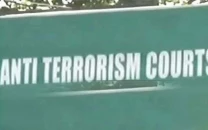Amnesty extended: Riyadh grants four-month reprieve to illegal workers
Saudi ministry warns that no leniency will be shown to after that.

Foreign workers break their fast outside a mosque in the Saudi capital Riyadh. PHOTO: AFP/FILE
Authorities in Saudi Arabia have given a four-month reprieve to illegal expatriate workers, extending their amnesty deadline and allowing them to either correct their visa status or return home without prosecution by November 2013.
The previous deadline was set at July 3, 2013. The latest amnesty period will now expire on November 4.
The extension is based on recommendations from the foreign affairs, interior and labour ministries of the Kingdom given the rapid response of the expatriate workers for the correction of their status.
Although the Saudi interior ministry has agreed to extend the deadline till November for the convenience of workers and businesses, it warned that no leniency will be shown to offenders after the extension has lapsed and all legal procedures applied to violators.
The embassies of Asian countries from which most of the workers hail welcomed the extension.
Foreign workers must have a Saudi sponsor in order to obtain residency permits.
According to the labour ministry, more than 1.5 million illegal foreign workers have come forward so far. Of these, some 180,000 have left the kingdom in addition to more than 200,000 unregistered workers expelled at the start of the year under new regulations to stamp out illegal immigration.
According to official statistics, eight million expatriates work in the kingdom, where there are reportedly around two million illegal workers.
According to reports, there are a large number of illegal Pakistani workers in Saudi Arabia who may face deportation. This new labour laws have been instituted to reduce the unemployment rate in the Saudi Kingdom, which is around 12 per cent (of which 40 per cent are high school graduates.) The labour ministry wants to implement a Nitaqat system, a scheme whereby every company employs around 6 to 30 per cent Saudis depending on the size and nature of the work the company. (With additional input from news wires)
Published in The Express Tribune, July 3rd, 2013.



















COMMENTS
Comments are moderated and generally will be posted if they are on-topic and not abusive.
For more information, please see our Comments FAQ